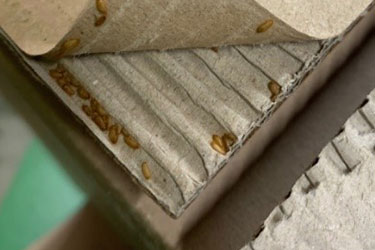Khapra beetle (Trogoderma granarium) is exotic and considered the 2nd most threatening plant pest for Australia.
While there is no immediate threat to human health or pets, if khapra beetle were to establish in Australia, it would pose a serious threat to many of our agricultural industries.
Detections
The department, along with its state and territory counterparts, is responding to detections of khapra beetle in imported goods.
In August 2020, khapra beetle was found in the packaging of a new fridge by a resident in Canberra, ACT, who quickly reported their find to the department.
An immediate response was launched, with tracing activities identifying the fridge was one of 76 imported in one infested shipping container.
The fridges were distributed to various locations across NSW and the ACT, by the one retailer. Khapra beetle was detected at multiple sites.
The department located, inspected, and removed the fridges from this consignment, and all but one were fumigated under a Biosecurity Order. The missing fridge went for recycling due to being damaged.
The NSW Department of Primary Industries has completed inspections and treatments on all but one site across NSW and the ACT. All other sites identified with fridges are currently undergoing trapping and monitoring to provide evidence that the pest is absent. Activities have been put on hold due to COVID restrictions but will resume as soon as lockdown ends.
To date there have been no further detections of khapra beetle associated with the fridges and the trucks used to transport them.A second response was launched in October 2020 when the department was notified of khapra beetle found in the packaging of a highchair in Canberra, ACT.
Tracing efforts identified 320 highchairs were imported in one infested shipping container. The highchairs in this consignment were distributed nationally to 57 retail stores (owned by the one company) and 2 distribution/handling facilities.
Affected highchairs that remained at the retail premises were immediately removed and secured by the department under a Biosecurity Order. These highchairs and the areas where they were stored were inspected and treated.
The remaining highchairs were sold to the public.
The department has located over 95% of the highchairs with inspections and treatments of the highchairs, affected properties and transport vehicles now in the final stages.
Food stuffs which are attractive to khapra beetle such as flour, grains, dried fruit, pulses, spices, and dried pet food were removed from the affected properties.
Approximately 50% of the sites are now in the proof of freedom phase. This phase involves the state departments checking specialised khapra beetle traps, and carrying out surveillance to provide evidence that the treatment has been effective and the pest is absent.
The department is also responding to a detection of khapra beetle in a consignment of mixed retail goods (bamboo toothbrushes, re-usable cloth nappies, and bed quilts) in QLD and northern NSW.
Khapra was found in the packaging or goods at 22 QLD stores, but due to the nature of the goods and their end use, the risk of khapra establishing in the environment is low.
A number of activities, including treatment of stores and surveillance, are being undertaken to verify proof of absence.
How to stop khapra beetle
The community
If you discover insects or pest activity when opening appliances and other goods, take immediate action. Do not use the goods, and do not throw them or their packaging away. Where possible seal it in a bag to prevent its dispersal. Be particularly vigilant when opening goods that have been imported from overseas or have been ordered online, because sometimes the origin of products online may not be evident.
If you do find something, report it immediately through our online reporting form or call the See. Secure. Report hotline on 1800 798 636.
Importers and port workers
If you work at a port, transport sea containers or unpack them, you need to be vigilant for khapra beetle and other hitchhiker pests. Use the links below to learn more:
- Khapra beetle overview video
- Check cargo, containers and vessels for pests video
- Sea container cleanliness video
Import requirements for khapra beetle
While there is no change to Australia’s trade status, the department is implementing a range of urgent actions to better safeguard Australia from khapra beetle. These actions include stricter import conditions for high-risk goods and sea containers.
To learn more, visit the urgent actions to protect against khapra beetle webpage.
National response arrangements
To learn more about the national pest and disease response arrangements, visit the Outbreak website.
Use the links below to see the khapra beetle information provided by your state or territory government:


